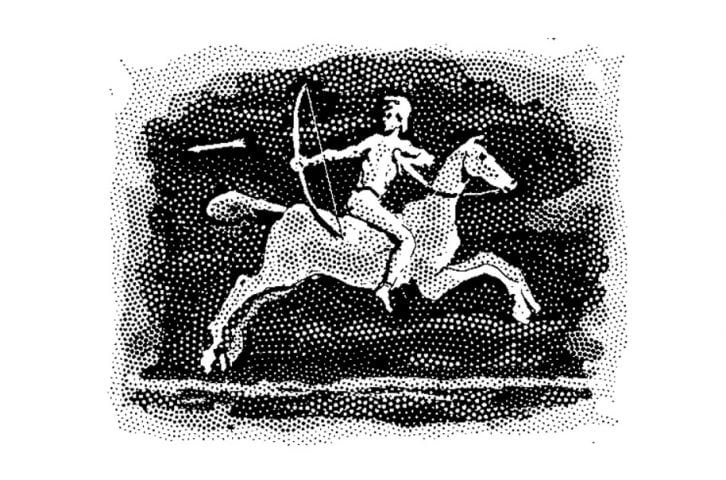Books Reviewed
A review of Philosophy Between the Lines: The Lost History of Esoteric Writing, by Arthur M. Melzer.
It is not easy to say just how good a book Arthur Melzer’s Philosophy Between the Lines is. It does not constitute the discovery, or recapture, of the great books and of their relevance to us, which was the accomplishment of Leo Strauss in the previous century. But it derives, as he says, from Strauss’s Persecution and the Art of Writing (1952) and provides an important introduction to the great books and to the character that shows them to be great, their esotericism. Today most everyone would freely admit that a great book offers a challenge to the mind, that to understand it requires a penetrating mind. “Esotericism” is the perfection of this requirement: let that begin a definition of the term.
A great book is the presentation of a great mind, one that reaches beyond its time to a universal audience, past and future. It draws from the experience of the past and from other great books preceding it, and it seeks an audience willing to question the assumptions of its time. Yet, because a great mind must live in a time, a great book addresses its time as well as a universal audience. To address one’s own time one must live within its assumptions; to reach beyond one must question them. With the recognition of a double need to assume and to question one arrives at the necessity for a double addressing, to a double audience, each side at odds with the other. With the necessity of addressing a double audience, one arrives at the necessity of esotericism, and of its twin, exotericism.
* * *
Happily, Arthur Melzer, a professor of political science at Michigan State University, does not reason as abstractly as this. For this easy deductive reasoning makes esotericism seem altogether reasonable: the experts speak abstrusely to one another and have a simpler language for those who have no need for the finer points of truth. Melzer starts, however, from the resistance to esotericism in our time, precisely on the part of our experts, our intellectual historians and philosophy professors, who do not merely overlook the existence of esotericism but also, when confronted with it, deny its very possibility. It is amazing to consider how so much evidence of esotericism is so widely disregarded and, when brought to the attention of the experts, so resolutely, even ferociously, denied.
Melzer presents some of “the hundreds of statements by philosophers from every historical period openly testifying to the use of esoteric writing.” From this task of collecting from so many sources, he shows just how much empirical evidence of esotericism there is for modern scholars to resist. Of course he had to accomplish his compilation unaided by the citations or the annotations of these scholars, who have managed to suppress normal human curiosity over secretive communication and to deflect their own announced scholarly goal of analyzing the historical importance of ideas. How could it happen that something so reasonable, so well attested, and so intrinsically interesting as philosophic esotericism has had what he calls a “lost history”?
Looking again at “esoteric” and “exoteric,” one sees that their meaning is not so simply distinguished as “permanent” differs from “timely.” The timely has interest for the philosopher as well as the permanent. The timely is what draws us to the concerns of the day, which means of the mortal human body with its preservation, comfort, and reproduction. In sum, it represents the social and the political, altogether the environment of the mind. Our minds, the rulers of our reason, may be directed toward what is universal and permanent, but they are encased in mortal, fragile bodies that require attention. Their care diverts us from exclusive preoccupation with the whole of things to these mundane concerns. But on reflection, one realizes that the whole must include ourselves, and so must comprise what is intelligible to our minds plus what is not.
Pursuing this conclusion, one sees that what is not intelligible seems to be the resistance to reason that arises from our personal concern, or the care for our bodies. Thus resistance to reason seems to be a permanent quality of the whole of things, shown in the chanciness of events—unintelligible—and the idiosyncratic aberrations of our minds—unintelligent. What is timely for us is also permanent in us. So the philosopher has something to learn about the whole of all things from the whole constituted by politics, the whole that is part convention of our time, part our permanent nature. In politics the philosopher sees the combination—the mixture in which we live—of reason and resistance to reason.
* * *
Can human reason overcome the human resistance to reason? Can the philosopher’s reason become what is today called “public reason”? In other words, can the difference between reason as it appears to the philosopher and as it appears in politics be overcome? Can the esoteric become generally known and thus overcome its difference from the exoteric?
In modern times, this feat has been attempted. So the difference between philosophy and politics—thought to be permanent by the ancients and their followers ever since—came to be regarded as temporary by modern philosophers. Their esotericism needed to continue for a time until prejudice and superstition were defeated, and then the world could prosper and bask in the condition called Enlightenment. In the time of Enlightenment a permanent change could be instituted in human societies that would overcome resistance to reason and make both esotericism and exotericism unnecessary.
What happened was not quite this. To overcome resistance to reason it proved necessary to ally the mind with human passions, with unreason, and to suppose that History with all its contrary passions would bring reason to sovereign power (as in Hegel) through the force of events said to be identical with the logic of arguments. In effect, however, the force of events in History took over from the arguments, and it came to be denied that reason could speak universally beyond the influence of a particular time: historicism was born. Historicism does not say that esotericism is unnecessary; it says esotericism is impossible. Melzer’s book shows that historicism is the reason why esotericism was lost to sight, indeed lost to History. It was lost both in the sense of no longer known to historians, and of no longer knowable to philosophers, who dogmatically denied that esotericism’s attempt to reach beyond History could ever succeed, because every thought is a child of its time.
* * *
In this line of thinking, the key to understanding esotericism is to understand why it was abandoned and forgotten. The reason is that philosophy itself, namely modern philosophy, conceived the ambition of making philosophy available to all in society in the enterprise of the Enlightenment. It is not that everyone would become a philosopher; there would still be self-identified philosophers, now all the more prominent because fulfilling a social and political function. They would make philosophy available through simplifications, so as to replace the prejudice and superstition of myth. These self-evident truths would make exotericism—the construction of myth—obsolete, and would make esotericism—the concealment of truth—unnecessary. In the end, reason would defeat the resistance to reason that justifies myth. Esotericism, representing and respecting the truth, as thought by ancient philosophers, that resistance to reason can never be overcome, would come to an end. The modern philosophers practiced esotericism themselves, to be sure, but Melzer shows that they did so with a bad conscience, believing that it would be necessary only for the time being, while the Church and its myths were still powerful.
Esotericism is based on the need, thought to be permanent, to fear and to respect the power of resistance to reason. Since man is a rational animal, the resistance to reason must itself be expressed in reasoning and rational terms—hence, the need for exotericism, for a rational doctrine that closes down excessive reasoning and brings it to a halt in dogma or belief. Exoteric doctrine is part of the self-protection of philosophy that is the most effectual reason for esotericism (which is not so much a doctrine as a practice), for philosophers have reason to fear the authorities that may persecute them for questioning authority. But as human beings with mortal bodies, philosophers share the common humanity of their fellows, for which their fellows deserve respect as well as fear. Besides, philosophers may learn from their being subject to the mixture of reason and unreason in politics. The practice of esotericism joins philosophy to society as well as keeps it independent of society, justifying while defying political authority. To abandon esotericism was the enterprise of modern philosophy, first in principle and, then, as its persuasions became more successful, in practice. The untoward consequence was to hand philosophical justification to political authority, and thus to subject philosophy to politics and philosophers to their environments, their times. This is historicism.
* * *
Historicism is not the only reason Melzer brings up for the disappearance of esotericism from the scholar’s horizon. He finds other reasons in “modern culture”: according to secular humanism, life poses no fundamental problems that cannot be solved; progress makes unnecessary the protection of popular prejudice, not to mention the consolation or inspiration of religion; esotericism offends our democratic egalitarianism; that its secrecy contradicts our liberal commitment to openness; that its dishonesty violates our moral code of truthfulness; that its caution seems to us cowardly; that its embrace of obscurity opposes our scientific culture of systematic rigor and replicable proof; that it denies the promise of universal enlightenment, leaving awareness to the cloistered few; that its playfulness with puzzles and riddles seems childish and unserious. He concludes: “It would be difficult indeed to point to another institution that offends us in so many different ways.” Yet historicism remains the key offense of that institution: reading between the lines collides with our certainty that no mind can free itself from its background, its context, its history.
Although Melzer explains so well why esotericism offends us, readers of his book on behalf of esotericism will not find it offensive. He himself is actually a pretty reasonable fellow, courteous to opponents and even solicitous for their needs, often providing them with arguments they might have overlooked. No one has gathered and stated the arguments against esotericism better than he. Because he knows that esotericism runs against the grain of modern culture, he does not expect, even with overwhelming evidence, to prevail. So he never becomes indignant over the neglecting and ignoring of so much evidence. Nor does he exasperate his readers, those he wants to persuade, with obscurity and overmuch ironic wit. He doesn’t try to be clever, not even by half. His book is comprehensive and, though long, easy to follow and a pleasure to read. Philosophy Between the Lines is respectful to the modern culture Arthur Melzer gently reproves, and his treatment is designed to convince it. In this sense it is as definitive as it could be.




